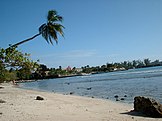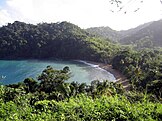Portal:Trinidad and Tobago/Selected article
| This page is currently inactive and is retained for historical reference. Either the page is no longer relevant or consensus on its purpose has become unclear. To revive discussion, seek broader input via a forum such as the village pump. |
| Note: Most of the article entries here are now being transcluded directly on the main portal page. However, this page should be retained for historical reference. |
Selected article 1
Portal:Trinidad and Tobago/Selected article/1 Eric Williams was educated at Queen's Royal College in Port of Spain.He won an island scholarship in 1932 which allowed him to attend St Catherine's Society, Oxford. He was ranked first in the First Class of Oxford students in 1935 and was graduating in History. On January 15, 1956 he established his own political party, the People's National Movement. At the Federation time, Williams famous speech declared that one from ten leaves nought. In 1961 the PNM had introduced the Representation of the People Bill. He was known as the Father of the Nation. Mr Williams made Trinidad and Tobago as an Independent Nation in 1962, was ceed from the United Kingdom and also the First Prime Minister of Trinidad and Tobago until his death in 1981.
Williams specialised in the study of slavery. Many Western academics focus on his chapter on the abolition of the slave trade, but that is just a small part of his work. In 1944 his book Capitalism and Slavery argued that the British abolition of their Atlantic slave trade in 1807 was motivated primarily by economics—rather than by altruism or humanitarianism. By extension, so was the emancipation of the slaves and the fight against the trading in slaves by other nations. As industrial capitalism and wage labour began to expand, eliminating the competition from slavery became economically advantageous.
Selected article 2
Portal:Trinidad and Tobago/Selected article/2 The Black Power Revolution, also known as the 1970 Revolution, Black Power Uprising and February Revolution, was an attempt by a number of social elements, people and interest groups in Trinidad and Tobago to force socio-political change. Between 1968 and 1970, a movement gained strength in Trinidad and Tobago that was greatly influenced by the Civil Rights Movement in the United States. The National Joint Action Committee (NJAC) was formed out of the Guild of Undergraduates at the St. Augustine campus of the University of the West Indies (UWI). Under the leadership of Geddes Granger (now Makandal Daaga), NJAC and the Black Power movement appeared as a serious challenge to the authority of Prime Minister Eric Williams.
This was coupled with a growing militancy by the trade union movement, led by George Weekes of the Oilfields Workers' Trade Union, Clive Nunez of the Transport and Industrial Workers Union and Basdeo Panday, then a young trade union lawyer and activist. The Black Power Revolution began with a 1970 Carnival band named Pinetoppers whose presentation entitled "The Truth about Africa" included portrayals of "revolutionary heroes" including Fidel Castro, Stokely Carmichael and Tubal Uriah Butler.
This was followed by a series of marches and protests. Williams countered with a broadcast entitled I am for Black Power. He introduced a 5% levy to fund unemployment reduction and later established the first locally owned commercial bank. However, this intervention had little impact on the protests
Selected article 3
Portal:Trinidad and Tobago/Selected article/3
The Jamaat al Muslimeen coup attempt was an attempt to overthrow the government of Trinidad and Tobago, instigated on Friday, 27 July 1990. Over the course of six days, Jamaat al Muslimeen, a Muslim organization, held hostages (including Prime Minister A. N. R. Robinson and other government officials) at the Red House and at the headquarters of Trinidad and Tobago Television. On 1 August, the insurgents surrendered.According to an interview by former minister of communications Gerald Hadeed, two days before the coup attempt, prime minister Robinson was warned that there might be an attempt to overthrow his government on that day and he was asked to have the scheduled sitting postponed. Robinson declined, however, claiming that he had taken an oath of office and he would not deviate from it in front of a potential threat.[1]
About 24 people died during the coup attempt, with millions in property losses. Among the dead was member of parliament for Diego Martin Central, Leo Des Vignes. Many people saw the coup attempt as the end of the power of the National Alliance for Reconstruction government.[2]
Selected article 4
Portal:Trinidad and Tobago/Selected article/4
Crown Point is a town in southwestern Tobago. It contains the Arthur Napoleon Raymond Robinson International Airport which was formerly known as the Crown Point Airport. It is near Store Bay, Buccoo Reef, and Pigeon Point.The Crown Point Lighthouse is an active lighthouse located in Scarborough, on the south west extremity of Tobago in the nearby the airport. The lighthouse consist of a square metal tower with gallery and lantern 26 metres (85 ft) high and has a focalheight of 35 metres (115 ft). It is powered by solar unit and emits an alternating group of four white flashing repeated every 20 seconds visible up to 16 nautical miles (30 km; 18 mi). (Full article...)
Selected article 5
Portal:Trinidad and Tobago/Selected article/5
Scarborough is the largest town and capital of the island of Tobago, one of the two main islands of the Republic of Trinidad and Tobago. Its population is around 17,000, almost one-third of the population of the island. The town is dominated by Fort King George, an 18th century fortification named after King George III which now hosts a historic/archaeologic museum. Scarborough's deepwater harbour was built in 1991; before that ships were forced to anchor offshore. Scarborough is located on the southwestern side of Tobago.Scarborough became the capital of Tobago in 1769 when it replaced the then-capital of Georgetown. Under French rule it was named Port Louis from 1789 to 1814. The city of Scarborough serves as the main seat of the Tobago House of Assembly, which is responsible for local governance in Tobago. (Full article...)
Selected article 6
Portal:Trinidad and Tobago/Selected article/6
Pigeon Point is also known as Pigeon Point Heritage Park (PPHP) and is often considered Tobago’s most beautiful beach and is home to the famous thatch-roofed jetty which has become an internationally recognised signature of Tobago. The resort includes a long stretch of white sand beach with warm aquamarine waters. There are excellent beach facilities such as bathrooms, showers and beach-chair rentals as well as bars and a restaurant. Tourist amenities include souvenir and water-sports shops.The peninsula has been the subject of major controversy over recent years after the property was bought by Dr. Anthony Sabga, founder and chairman of the Trinidad-based Ansa McAl conglomerate.
In early 2005 the government promised to purchase the property; by compulsory purchase order if necessary. A deal was struck and the peninsula became the property of the Tobago House of Assembly (THA) in late 2005 at a cost of $106 million TT dollars. (Full article...)
Selected article 7
Portal:Trinidad and Tobago/Selected article/7
Englishman's Bay is a secluded beach on the leeward coast of Tobago, between Castara and Parlatuvier. Although the bay does not draw the large numbers of beachgoers that Tobago's western beaches do, it is considered of the island's most beautiful. The beach itself is a classic crescent shape, capped by two heavily forested headlands descending from Tobago's Main Ridge. The sand starts immediately after the forest ends and is of a shallow to medium gradient and somewhat coarse grain.The beach itself does not change size drastically at high or low tides, due to the gradient. There is pretty heavy beach break. Owing to the number of waves the beach does not boast magnificent snorkeling. As of 2018, there is only one small restaurant/shop and a single stall unisex bathroom. (Full article...)
Selected article 8
Portal:Trinidad and Tobago/Selected article/8
Learie Nicholas Constantine, Baron Constantine, Kt, MBE (21 September 1901 – 1 July 1971) was a Trinidadian cricketer, lawyer and politician who served as Trinidad and Tobago's High Commissioner to the United Kingdom and became the UK's first black peer. He played 18 Test matches for the West Indies before the Second World War and took the team's first wicket in Test cricket. An advocate against racial discrimination, in later life he was influential in the passing of the 1965 Race Relations Act in Britain. He was knighted in 1962 and made a life peer in 1969.
Born in Trinidad, Constantine established an early reputation as a promising cricketer, and was a member of the West Indies teams that toured England in 1923 and 1928. Unhappy at the lack of opportunities for black people in Trinidad, he decided to pursue a career as a professional cricketer in England, and during the 1928 tour was awarded a contract with the Lancashire League club Nelson. He played for the club with distinction between 1929 and 1938, while continuing as a member of the West Indies Test team in tours of England and Australia. Although his record as a Test cricketer was less impressive than in other cricket, he helped to establish a uniquely West Indian style of play. He was chosen as one of the Wisden Cricketers of the Year in 1939. (Full article...)
Usage
The layout design for these subpages is at Portal:Trinidad and Tobago/Selected article/Layout.
- Add a new Selected article to the next available subpage.
- Update "max=" to new total for its {{Random portal component}} on the main page.
Adding entries
Feel free to add FA-Class Trinidad and Tobago articles, A-Class Trinidad and Tobago articles, GA-Class Trinidad and Tobago articles to the above list.
- ^ "Hadeed: I warned Robinson about 1990 coup attempt". Trinidad Express. 6 April 2014. Retrieved 22 July 2014.
- ^ Robert Walker (3 June 2007). "Profile: Jamaat al Muslimeen". BBC News. Retrieved 22 July 2014.






